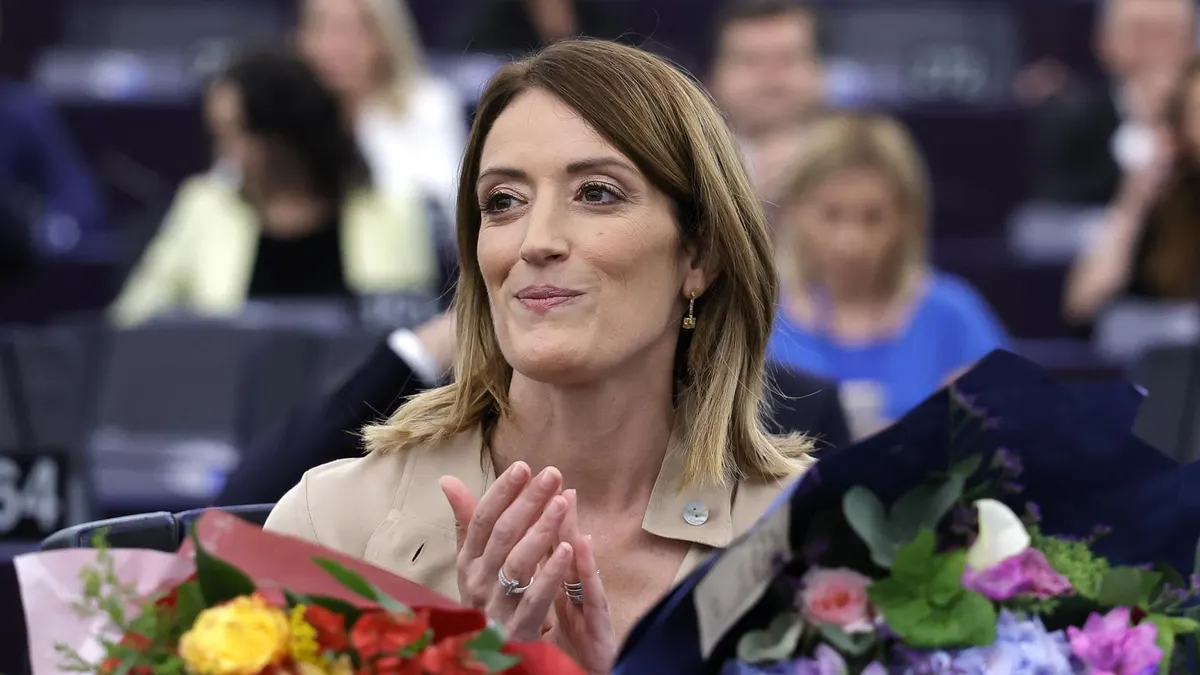
The plenary session of the European Parliament approved this Tuesday in its constituent session the Renewal of the institution’s presidentthe Maltese member of the European People’s Party (EPP) Roberta Metsola, for two and a half more years, with an absolute majority of 562 votes in favour of the 623 valid votes expressed in the first round of voting.
The European Left introduced the MEP of We can Irene Montero as an alternative candidate late on Monday, shortly before the deadline for doing so, but it was a symbolic proposal given that she only had the support of her own group at the start. Finally, Montero has managed to obtain the endorsement of 61 MEPsa result that improves the 46 votes secured by his own group.
“This must be a Chamber without fear of leading and changing“We have started but we are not finished yet. We need to strengthen and streamline our operations to ensure that this Parliament can be the legislative and political power we want it to be,” Metsola said in her speech as a candidate, prior to the vote.
He has argued that this legislature must have “a strong Parliament in a strong Union” and to achieve this, he warned, “we cannot accept that our role as deputies be diluted, parliamentarianism must be strengthened.”
Metsola has counted on the majority support of the so-called center coalition which maintains its group, the EPP, with the Socialists and Democrats (S&D) and the liberals (Renew), as part of the agreement to share the top positions in the EU and which includes the renewal of the president of the European Commission, Ursula von der Leyen, who will be voted on Thursday.
Also the group of European Conservatives and Reformists (ECR), led by the Brothers of Italy of Giorgia Melonisaid in a statement that a “vast majority” of its MEPs support Metsola’s re-election because they value her “commitment to dialogue and her openness to balance and compromise, even when there are strong differences of opinion.”
In a press conference prior to the vote, the co-president of the Left, the Frenchwoman Manon Aubry, explained that the decision to present an alternative candidacy – despite recognising Metsola’s “inclusive will” – responds to the need to “show that there is no unanimity, that there is a left-wing opposition that makes itself heard” and to do so with a feminist figure like Montero.
In her speech prior to the vote, Montero said that her candidacy represents the defense of “a Europe of peacewhich bets on the end of the genocide of the Palestinian peoplefeminist, green, anti-racist, anti-fascist, for workers’ rights and social justice.” These words were met with some boos, which were drowned out by applause.
Following Metsola’s re-election, the plenary meeting in Strasbourg (France) will continue with the Election of the 14 Vice-Presidents of the European Parliament -to which two Spaniards aspire: the ‘popular’ Esteban Gonzalez Pons and the socialist Javi López- and the four quaestors of the institution.
A more fragmented European Parliament
The 10th legislature starts with a Most fragmented hemicycle that in the past and with a rise of the far right This has resulted in the formation of three groups within this movement. 54% of MEPs are occupying a seat in the European Parliament for the first time and 39% of the chamber is occupied by women.
The European People’s Party (EPP) was the most voted in the elections of June 9, which has allowed him add 188 seats of the 720 in play. They are followed by the Socialists and Democrats (S&D), with 136 MEPs, and the new far-right alliance promoted by Hungarian Prime Minister Viktor Orbán, Patriots for Europe, with 84 seats, including the 6 of Vox.
In fourth place are the European Conservatives and Reformists (ECR), the second far-right force in the European Parliament, with 78 seats, and whose main delegation is the party of Italian Prime Minister Giorgia Meloni, Brothers of Italy.
Thus, they fall into the Fifth place European liberals (Renew Europe – RE), with 77 seats; followed by the Greens, with 53; European Left, with 46; and closes the Europe of Sovereign Nations, which has 25 seats and is led by the German far-right Alternative for Germany. There are also 33 MEPs who do not belong to any group and are listed as not registered.
Source: Lasexta
Ricardo is a renowned author and journalist, known for his exceptional writing on top-news stories. He currently works as a writer at the 247 News Agency, where he is known for his ability to deliver breaking news and insightful analysis on the most pressing issues of the day.












